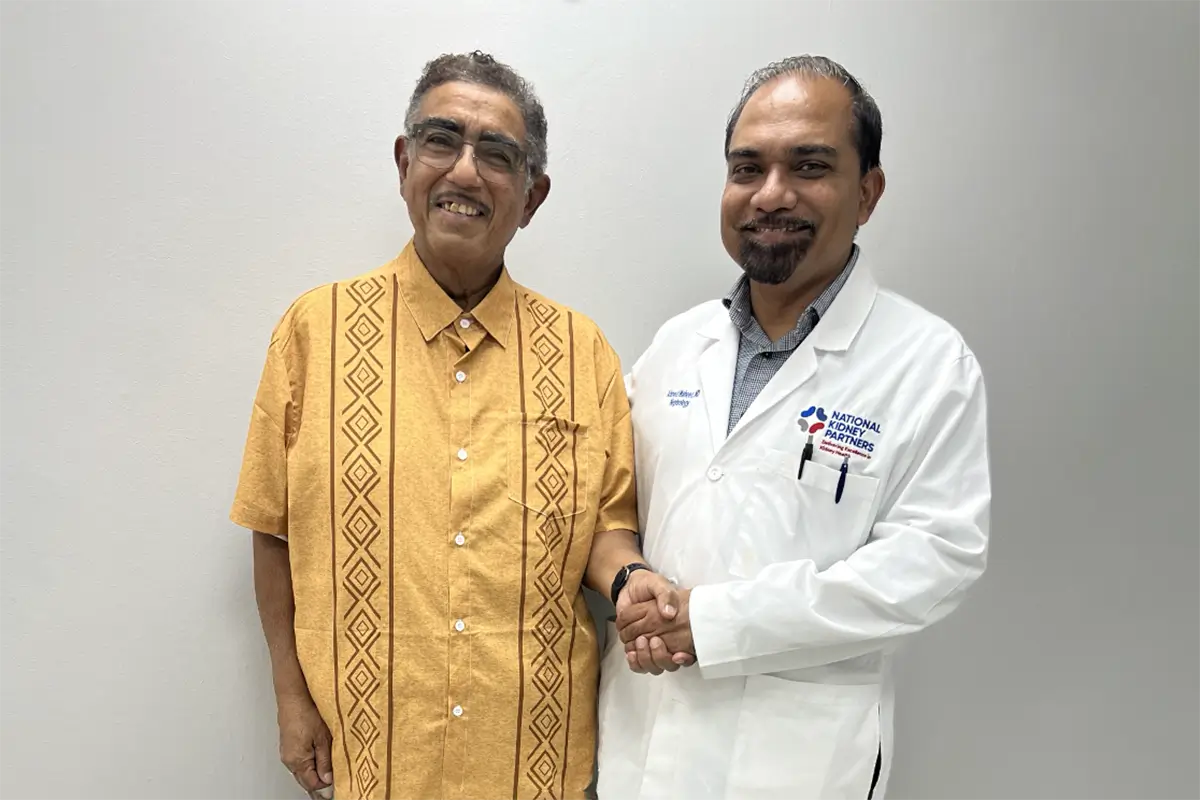From Crisis to Recovery: A Kidney Patient’s Journey
Home > From Crisis to Recovery: A Kidney Patient’s Journey
Featuring Luciano, Kidney Transplant Recipient and Long-Time Patient of Dr. Waheed with National Kidney Partners
In Conversation with Carly Hamid, Transplant Recipient and Executive Director of National Kidney Partners Foundation

Medical History and Emergency Hospitalization
On Thanksgiving Day in 2019, Luciano—a long-time patient of Dr. Waheed at National Kidney Partners—was told by an emergency physician that he had only two days to live. The diagnosis: end-stage kidney failure. At the time, Luciano had been putting off medical care due to work obligations and was unaware of how advanced his condition had become. He was admitted to the hospital in critical condition.
Dialysis Procedures and Complications
Luciano was rushed into emergency hemodialysis immediately upon arrival. Due to the urgency, the procedure was performed without anesthesia. During this initial care—before he was under Dr. Waheed’s supervision—a serious complication occurred: an arterial puncture caused blood to fill his lungs, requiring emergency intervention and drainage.
Note: This incident did not occur under Dr. Waheed’s care.
Over time, Luciano had to undergo multiple access point changes and adjustments to stabilize his dialysis treatment. Each procedure took a toll on him physically and emotionally.
Transition and Challenges with Dialysis Types
Once stabilized, Luciano attempted peritoneal dialysis, which would have allowed more independence. Unfortunately, the treatment failed due to abdominal leaks on both sides. He returned to hemodialysis. Later, a fistula procedure led to a collapsed vein, requiring further surgical intervention.
Patient Education and Self-Advocacy
Instead of remaining passive in his care, Luciano took control. He began educating himself through YouTube, Google, and online patient forums to better understand his condition, treatment options, and dietary needs.
“Become your own advocate. Ask questions. Don’t assume someone else will do it for you.”
Carly Hamid, also a transplant recipient and Executive Director of National Kidney Partners, echoed this sentiment. She emphasized the importance of patient empowerment through knowledge and proactive engagement.
Advice for New Patients
Luciano and Carly shared valuable advice for those beginning their dialysis or transplant journeys:
Trust your care team, but do your own research.
Communicate openly with your doctors and nurses.
Understand your medications, diet, and lab results.
Find peer support—you are not alone.
Discipline, Nutrition, and Life After Transplant
Kidney Transplant Journey and Cancer Diagnosis
Luciano was originally scheduled for a kidney transplant two years ago. However, a stage one prostate cancer diagnosis delayed the procedure. He underwent six weeks of radiation therapy, and after being cancer-free for two years, he successfully received a kidney transplant on April 8, 2025—just one month before this conversation.
Importance of Discipline and Self-Care Post-Transplant
Post-transplant success, according to Luciano, requires structure and accountability:
He takes his medications on a strict schedule
Follows a keto diet for overall health
Monitors his vitals daily
Adheres closely to his care team’s guidance
Luciano also underwent bariatric surgery and lost 170 pounds—dropping from 350 to 180 pounds. This transformation significantly improved his health and recovery outlook.
Personalized Diet and Cultural Nutrition Considerations
Dietary Challenges for Dialysis and Transplant Patients
Both Luciano and Carly criticized the one-size-fits-all diet guidelines often given to kidney patients. These recommendations can be culturally irrelevant or impractical.
Luciano, who has Caribbean roots, researched local fruits, vegetables, and spices to maintain proper phosphorus and potassium levels. He emphasized the need for culturally relevant dietary guidance.
Carly, who follows a pescatarian diet, also saw significant improvement in her lab results after customizing her meals to suit her body and lifestyle.
Peer Support and Patient Advocacy
Luciano now mentors younger patients at his dialysis center, many of whom lack support or guidance. He encourages them to ask questions, work with their dietitians, and educate themselves.
Carly highlighted the growing impact of grassroots patient communities and advocacy groups, which offer education, encouragement, and practical resources. Both agree: peer support can change lives.
Communication with Healthcare Providers and Media Sharing
Luciano stressed the importance of understanding new medications, asking about side effects, and following up with providers. Carly added that tracking your health records and staying involved in your care is crucial.
The discussion also touched on the technical aspects of sharing patient stories, noting that shorter video clips (under 8 minutes) are easiest to manage and share.
Final Reflections and Takeaways
Luciano’s story is one of survival, transformation, and leadership. Today, he is:
Two years cancer-free
One month post-kidney transplant (as of May 8, 2025)
Living a disciplined, healthy lifestyle
Supporting and mentoring fellow patients
A living example of the power of self-advocacy
Key Takeaways:
Informed patients make better decisions.
Culturally relevant nutrition matters.
Discipline is essential after transplant.
Peer mentorship empowers others.
Trust and communication with your care team are vital.
As Carly concluded:
“Luciano shows what’s possible when patients are informed, involved, and inspired.”
